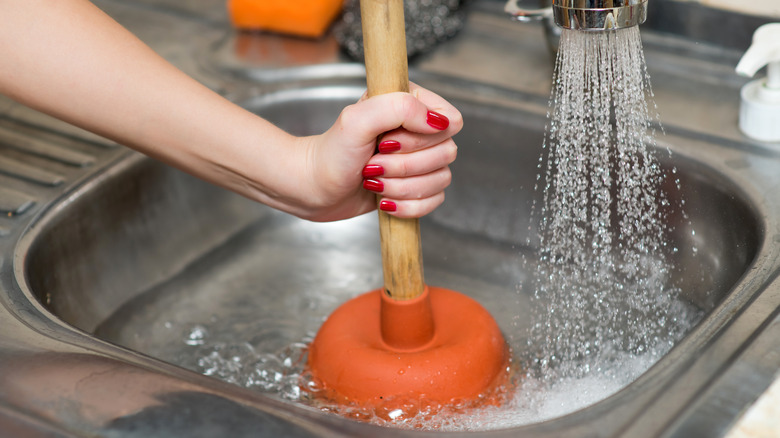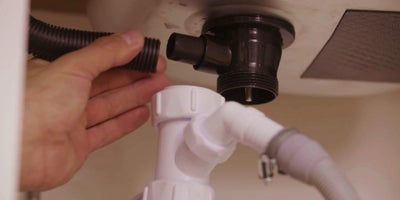Crucial Advice On How To Fix A Slow-Draining Sink
Crucial Advice On How To Fix A Slow-Draining Sink
Blog Article
The article author is making several great points about 7 Ways To Fix A Slow-Draining Sink Before You Call A Plumber as a whole in this article down below.

Intro
We've all been there: You're brushing your teeth or washing your hands, and you notice the water pooling in the sink. Rather than swiftly swirling down the drain, it sticks around, turning your once-refreshing morning regimen right into a miniature swamp scene. A slow-draining sink isn't just annoying; it's usually a sign of bigger plumbing issues lurking underneath the surface. Fortunately is that most slow-draining sinks can be fixed with a little know-how, a few basic devices, and some patience. All set to tackle this project head-on? Allow's roll up our sleeves and dive right in.
Comprehending the Causes of a Slow-Draining Sink
Prior to you start poking around in your pipelines, it aids to know what may be causing the slowdown. Recognizing the origin makes it simpler to choose the ideal repair.
Tools and Materials You'll Need
The right devices make all the distinction. The good news is, you won't need a totally stocked plumber's van to finish the job.
Step-by-Step Overview to Repairing a Slow-Draining Sink
Currently, allow's get involved in the nitty-gritty. This step-by-step procedure will guide you with simple methods to restore your sink's drainage.
Action 1: Get Rid Of and Clean the Stopper
Usually, the stopper (that little plug you lower to obstruct water) is the very first perpetrator. Remove it meticulously and wipe any type of hair or substance entraped around its base. Rinse it thoroughly prior to putting it back in place.
Action 2: Use a Bettor to Remove Debris
Got that bettor ready? Setting it over the drain and give it a couple of firm pumps. The idea is to develop suction that can loosen up any kind of blockage. If you see little bits of debris drifting up, you get on the best track.
Step 3: Attempt a Drainpipe Serpent or Cable Hanger
If the plunger does not suffice, it's time to draw out the drainpipe snake. Carefully feed it right into the drain and spin as you go. You might really feel some resistance-- that's most likely the clog. Keep turning and pulling till you get rid of the blockage. If you do not have a drainpipe serpent, a straightened cord wall mount can operate in a pinch.
Step 4: Apply a DIY Drainpipe Cleanser
An all-natural cleaner made from baking soft drink and vinegar can break down recurring grime. Put half a cup of baking soda into the drain, complied with by half a mug of vinegar. Allow it fizz for about 15 mins, after that flush with warm water. This chain reaction commonly does marvels for small blockages.
Step 5: Reconstruct and Examine the Sink
Put whatever back with each other and run the tap. Does the water now swirl away at a respectable rate? If yes, offer yourself a pat on the back. Otherwise, do not despair-- there are still a few more dress up your sleeve.
Important Tools for Do It Yourself Services
A bettor is your best starting factor. A tiny, sink-sized bettor develops suction that can dislodge small obstructions. For more consistent obstructions, a drain serpent (sometimes called a plumber's auger) functions marvels. A set of handwear covers, a flashlight, and possibly a set of safety safety glasses are additionally useful.
Suggested Cleaning Solutions
Light recipe soap and warm water can aid break down oily accumulation. A blend of cooking soda and vinegar is a reliable natural remedy, and enzymatic cleansers supply a more eco-friendly strategy. Maintain chemical drain cleaners as a last resource, as they can be severe on your pipes.
Typical Perpetrators Behind Slow Water Drainage
So, what's obstructing points up? Commonly, it's a mixture of everyday debris-- think hair, soap residue, tooth paste deposit, and remaining food bits. Over time, these little bits accumulate and cling to the pipeline walls, progressively narrowing the passage and making it harder for water to travel through. In many cases, mineral deposits from difficult water can additionally include in the gunk, developing the best tornado for stubborn obstructions.
When is it Time to Act?
If you see the water draining pipes slower than normal, it's a great idea to step in quicker rather than later. Waiting as well long could result in finish blockages, undesirable smells, or even pipeline damage. If the water takes more than a few seconds to clear out after switching off the tap, consider it a red flag and prepare yourself to put on your do it yourself hat.
Security First: Precautions and Preparations
Prior to you launch into unclogging setting, consider safety and security. You're handling potentially dirty water and debris, so slip on a pair of gloves. If you're making use of chemical cleansers, guarantee the room is well-ventilated and adhere to the directions on the label.
Protective Equipment and Work Area Arrangement
Put down some old towels or dustcloths around the sink area to capture dashes. Clear away any kind of items that may get in your method, like soap dispensers or toothbrush holders. Make sure you have excellent lights-- get a flashlight if needed.
Alternative Techniques for Stubborn Clogs
Not all clogs are created equal. If your sink still declines to coordinate, consider these alternative solutions.
Sodium Bicarbonate and Vinegar Approach
We already discussed this, but it's worth noting again. This gentle, eco-friendly method is much safer than chemical cleaners and frequently fairly effective.
Chemical Drainpipe Cleaners
Enzyme-based cleansers make use of natural microorganisms to digest organic matter. They're a superb choice if you're wanting to prevent severe chemicals. Just keep in mind, they may take a bit longer to work their magic.
Chemical Drain Cleaning Company: Benefits And Drawbacks
Chemical cleansers can blow up through difficult clogs fast, yet they're not without drawbacks. They can generate heat and fumes, damage pipelines if made use of excessively, and position ecological risks. Utilize them sparingly, and constantly adhere to the directions thoroughly.
Preventive Measures to Keep Your Sink Flowing
Avoidance is the best cure. By taking on a few straightforward practices, you can maintain your sink from slowing down in the first place.
Regular Cleaning Up Behaviors
Clean down the sink basin and fixture area on a regular basis. Remove hair or food particles before they have a chance to wash down the drain.
Preventing Unsafe Compounds Away
Think twice before disposing coffee grounds, grease, or coarse veggie scraps down the sink. These culprits hold on to pipe walls, creating obstructions over time.
Routine Upkeep Checks
Set up a quick regular monthly evaluation. Run hot water through the sink for a couple of minutes, focusing on the circulation. If it seems sluggish, act quickly before it ends up being a full-blown clog.
When to Call a Specialist Plumbing Professional
In some cases, despite how difficult you try, that clog simply will not move. That's when it's time to generate the pros.
Signs That Show a Much More Severe Problem
If your sink drains pipes slowly despite numerous attempts, or if you notice water backing up in various other components (like your shower or commode), you may have a more severe plumbing problem prowling deeper in the system.
Balancing DIY Efforts with Specialist Help
While DIY can conserve you money and supply a feeling of achievement, there's no pity in calling an expert. A specialist plumbing can analyze your entire pipes arrangement, making sure there's no underlying damage or long-lasting trouble that might cost you a lot more later on.
Comparing Prices and Long-Term Solutions
Before choosing, think about the big picture. An affordable, quick fix might address the problem momentarily, yet purchasing a much more permanent option might save you money and stress and anxiety over time.
Weighing the Expenses of Do It Yourself vs. Specialist Fixes
DIY solutions usually set you back little bit more than the cost of a bettor or a container of cooking soda. Expert services, on the other hand, featured a cost but might prevent repeated problems and pricey repairs later on.
Purchasing High Quality Fixtures and Upgrades
If your sink's style adds to constant blockages, it might be worth updating to higher-quality components or altering the pipes layout. Consider this an investment in your house's performance and comfort.
Verdict
A slow-draining sink can feel like a small irritation, but it's frequently an indicator that your plumbing needs a little tender loving care. By recognizing the source, using the right devices and methods, and committing to basic safety nets, you can keep your sink streaming openly. And when all else fails, never wait to employ a professional-- your home's plumbing is worth the investment in care and maintenance.
Three Common Ways to Fix a Slow Drain
Baking Soda Method
Boil a full pot of water. Measure out cup of baking soda and pour it down the drain. Then take cup of the magical cleansing substance known as white vinegar and drop that down there too. Allow the mixture to fizz in the drain for five minutes as the vinegar and baking soda combine. Now dump in that whole pot of boiling water. This combination of cleaning substances should clear out anything that is causing your sink to drain slowly. If it doesn t...
Zip-It
If the baking soda method doesn t clear out your drain, it may be because a significant amount of hair and/or other debris has collected there and you need to remove it. Purchase a Zip-It tool at any home improvement or hardware store and insert it into your drain. It will catch any collected hair or debris that s blocking the flow of water. Pull it out. If it s got a big clump of hair, etc. on the end, you ve probably got your culprit.
Drain Cleaner
If these methods don t work, there is the standard drain cleaner that you can also buy in a hardware store or even your local grocery store. It s better if you can use a household solution, but these drain cleaners often work in a pinch. They re very simple to use. You generally just dump them in your drain and wait. If even this method is not effective, it may be time to call the plumber.
https://www.mrrooter.com/oneida/about-us/blog/2017/july/three-common-ways-to-fix-a-slow-drain/

As an avid reader on 7 Ways To Fix A Slow-Draining Sink Before You Call A Plumber, I think sharing that segment was a great idea. Liked our blog posting? Please quickly share it. Help somebody else discover it. I praise you for being here. Return soon.
Estimating Report this page